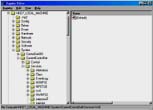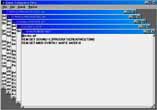
|

|

=Windows 98/SE Tweaking=
[Control Panel]
Add/Remove Programs:
Tab: Install/Uninstall:
Delete all the programs that you no longer need here, simple right? <to save disk space>
DirectX:
Proceed to my "Top Downloads" section and download the file called "DirectX.cpl".
Instructions on how to use the file is included inside the zip file.
Display:
Tab: Screen Saver:
select "none"
Settings: Colors : 16-bit for comps w/o 3d accelerator or comps with only 16mb 3d accelerator
-32-bit
for comps with a 32mb 3d accelerator.
>Advanced: Adapter: make sure you have the latest driver for your
video or graphics card. <smoother performance specially with games>
>Refresh Rate: optimal <lesser eye strain>
Monitor: Install the driver that is specific to ur monitor.
Performance: full <better performance>
Multimedia:
Tab: Audio>Playback>Preffered Device: select your sound card driver.
>put a check
mark at the "use only preferred devices" box.
>Advanced properties
Tab: Speakers: select the appropriate speaker
setup
Perfomance>Audio playback>Hardware Acceleration: Full <decrease one increment at a time if ur having sound
related problems>
>Sample Rate conversion quality: good.
*set to best if you have a fast comp and good quality
soundcard.
Power:
*Select "never" in all 3 boxes. <better performance>
Sounds:
I recommend removing all windows sounds (which is often included with desktop themes) for smoother
windows performance.
System:
Tab: Device Manager: Double click "CD-ROM", and double click
on your cd-rom drive.
>Settings: put a check mark inside the "DMA" box <better access time>
*If u have a
CD-writer drive, I suggest that you leave the DMA box unchecked. But u can still try enabling it, at ur
own risk of having burning probs afterwards. Don't get me wrong though, it is possible to enable DMA with CD-RW's and
experience zero probs, but we juz want to be safe.
Double click "Disk Drives", and double click ur harddisk/s
>Settings:
put a check mark inside the "DMA" box (be reminded that not all harddrives supports DMA,
so if ur harddisk acts weird after this tweak, remove the DMA check mark and reboot)
Double click "System Devices",
double click "PCI bus"
>IRQ Steering Tab: Remove all other check marks except on "Use
IRQ Steering" AND "Get IRQ Table Using MS Specification Table" <this will enhance PCI performance and/or stability>
**Note: Some hardware/s require
some of the settings above to function. And will automatically revert back to the default setting after reboot. If however
the OS wasn't able to revert back to the default setting, some of ur hardware/s (eg. modem) may fail to work. Simply revert
back to the default settings "manually" in case a problem like that occurs. Tnx to Jan Erik Sigdell
Double click
"Direct Memory Access Controller"
>Settings Tab: Put a check mark on the "Reserve DMA Buffer" box and put a value of
"64" (w/o the quotation marks) on the box.
***u should only perform this tweak if u have a
device with the "DMA" option enabled.
Performance: >File system
Tab: Hard disk: Typical Role: Network Server (for comps w/o
"Cacheman" program)
Read Ahead Optimization:
Only set to "Full" if you do not engage in heavy multitasking. I highly suggest to set this to zero (slider all the way to the left) if you only have 64mb or lower RAM
and multitask a lot. <smoother multitasking>
Floppy Disk: "uncheck the box" <faster boot-up>
CD-ROM: supplemental
cache size:
For 32mb (or lower) RAM comps: small
64mb comps: center
128mb and above comps: large
*Note
that you can always give the above setting a lower value to conserve RAM.
>Access pattern: quad speed or higher
Removable
Disk: "put a check mark" <better disk drive performance>
Troubleshooting: "uncheck all boxes"
>Virtual
Memory:
*If u have more than enough free space left, set the minimum and maximum at:
224mb OR 384mb for comps
with 32mb RAM
192mb OR 224mb for comps with 64mb RAM
128mb OR 160mb for comps with 128mb RAM
96mb OR 128mb
for comps with 192mb RAM
96mb OR lower for comps with 256mb RAM
***Be informed that the above settings
are quite prescise for users who uses their comp for browsing the net, listening to music <mp3's (winamp)>, playing
games, photo editing, etc. But those values wouldn't be sufficient for those who edit videos, render
3D graphics and stuff. If that's ur case, then I highly recommend that u head to my "memory tweaking guide" section!
**There
are some reasons why you should apply this tip with your comp. First reason is because it frees up windows from doing the
balancing of Virtual Memory for you. In result, you will have a significant increase in performance. And second is because
it prevents your system from using the fragmented part of your Harddisk for Virtual Memory. But if you feel like giving away
that much of disk space for virtual memory is just a "space killer", you can just let windows manage your virtual memory,
and lose some performance in return. It is highly recommended to use Norton Speed Disk after
applying this tweak and allow the program to "optimize swap file" so it will perform even faster.
*You should try
the first option first b'coz it's quite faster than the second option b'coz it has a lower setting. Take note that the lower
VM setting you set, the faster it performs, but increasing the risk of running out of memory
when playing memory hungry programs and/or games. When that happens, only then should you try the second setting or head on
to my "memory tweaking guide" section!
=System Information=
Go to Start>Programs>Accessories>System Tools>System Information:
Click
on Tools>System Configuration Utility
OR
Go to Start>Run>Type in: msconfig
Tab: Startup
*remove the
check marks to all those unnecessary programs that automatically load at startup. Ex: task monitor,
load power profile, fast find. I recommend leaving only "SystemTray" and "ScanRegistry" enabled, other programs are optional
with ur own preference. <for faster boot-up time and higher system resources>
=Disk Cleanup=
Put a check mark on the "Temporary Internet
Files" and "Temporary Files" box, then click "ok".
(this will clean ur temporary directory and save disk space)
=Registry Hacks=
Go to Start>Run>Type "regedit"
(w/o the quotation marks) then go to: HKEY_LOCAL_MACHINE\SYSTEM\CURRENT CONTROL SET\SERVICES\VxD\BIOS
-then on the
right side of ur screen, right click on the blank space and create a new "DWORD" value and give it a name of "CPUPriority"
(w/o the quotation marks). Then double click on it and give it a value of 1. <this will significantly improve loading times
of ur programs> Not recommended for folks using an AMD processor. You guys are
free to apply this tweak with your AMD system ... the risk is yours to take!
(on the same key/folder)
-right click on the blank space on the right side and create a new "DWORD" ... give it a name of "fastDRAM", "AGPConcur",
"PCIConcur" (w/o the quotation marks). Double click on every single one of them and give 'em all a value of "1" (w/o the quotation
marks) <said to make ur hardware perform better>
go to: HKEY_LOCAL_MACHINE\System\CurrentControlSet\Control\SessionManager
-then on the right side of ur screen, right click on the blank space and create a new "key" and give it a name of
"MemoryManagement" (w/o the quotation marks). Then open ur newly created key/folder and right click again on the blank space
on the right side and create a new "DWORD" and give it a name of "SecondLevelDataCache" (w/o the quotation marks). Double-click
on it and give it a 'hex' value of 200 for PII and PIII comps, or 80 for CeleronA comps. <this will let ur system use all
ur available cache for faster system performance>
go to: HKEY_LOCAL_MACHINE\System\CurrentControlSet\Control\FileSystem
-on the right side of ur screen, double-click "ContigFileAllocSize" (or create a "dword" if it is not yet written
there) and select one of the value (decimal) given below:
Normal users: 1024
Heavy multi-taskers: 1536 (or higher)
**this tweak enhances ur HD's performance by decreasing fragmentation time. Visit my Memory Tweaking Guide under Cacheman
section for more info!

=System Editor=
Go to start>run>type: sysedit
*under
AUTOEXEC.BAT
>type a "rem" (w/o the quotation marks) to each of the device drivers in there
example:
REM A:220 soundblaster (etc)
(saves memory at start-up)
*under CONFIG.SYS
>Delete
everything that is in here. And add "Stacks=0,0" (w/o the quotation marks)
(prevents Windows from experiencing the "Stack
Overflow" error)
**you can also delete the CD-ROM device driver in both autoexec.bat and config.sys if u no longer
use ms-dos programs
*under SYSTEM.INI:
**insert or edit the lines mentioned here (if
it already exists) under the [386enh] section
-type in "ConservativeSwapfileUsage=1" (w/o the quotation marks of course)
(this will make windows lessen the use of virtual memory, games will surely benefit from this.)
***Be
warned that systems with less than 128mb RAM (96mb and lower) should not apply this
line with their system! You need 'quite' a lot of RAM to support this line, if you have a small amount of RAM, you will need VM's help for swapping ok? :)
-LocalLoadHigh: set this to 0
(unless u
still run DOS programs/games <w/c i really doubt bdway> set this to "1")
-DMABufferSize: set this to 64
-type
in "32BitDiskAccess=on" (w/o the quotation marks)
(better disk performance)
-type in "pagebuffers=32" (w/o the
quotation marks)
-type in "MinTimeSlice=40" (w/o the quotation marks)
-type in "MaxBPs=xx" (where xx is the
number in kb w/o the quotation marks <"16384" for 128mb RAM or lower machines and "32768" for 192mb RAM or more machines>)

=Msdos.sys=
***MSDOS.SYS is located on ur root
directory. "Show all files" must be enabled for u to see the file. Also, u have to right-click>properties the file and
untick "read-only" for u to be able to save ur changes.
Add the following lines under "options"
DoubleBuffer=2
(enables double-buffering)
BootDelay=0
(faster reboot)
Dblspace=0
(disables compression)
Drvspace=0
Logo=0
(disables Win98 splash screen at start-up <u can alternately hit the "esc" button to get rid of the
logo at start-up>)
DisableLog=1
(if enabled ... Win98 will no longer create/update the file called
"Bootlog" on ur HD's root directory. will ever so slightly decrease ur boot time)
*Exit and save changes
=Misc. Tips=
Quick Reboot:
-go to: settings>taskbar then add a new shortcut with the following command line: C:\WINDOWS\RUNDLL.EXE
user.exe,exitwindowsexec
*Clicking on the new shortcut will reboot windows in a quicker fashion (will no longer proceed
to POST)
-Clean ur registry, I recommend using "RegCleaner" (link inside my dl section)
-Defrag (full defrag)
once every 2 weeks if u use ur comp everyday and if u play lots of games. If not, once a month will be enough.
**A more effective way of optimizing ur HD using 3rd party defragging softwares
can be found inside "PC Protection and Maintenance" section.
-Run Scandisk at least once a week to check
for errors
-Check for program/game patches, and device driver updates at least once a month.
***It's very important
to update ur device drivers since it fixes many probs with ur current driver and enhances its performance that will in result
speed up your system.
-Remove any other programs on your taskbar before playing games.
-Disable MS Office's
"findfast" inside control panel, I do not have this program installed in my comp, so I cannot guide you on how to do that,
but it does help speed up your system if you disable it.
-Press ctrl-alt-del before playing games. Make sure that
only "explorer" and "systray" are running. "End task" any other programs.
-Check for IRQ conflicts inside control
panel>system>system devices. If there are any conflicts and/or other problems there (those with an "exclamation point"
icon besides them for example), remove, re-install them or adjust the irq setting manually.
Last Updated: 072803
=Closed to future updates=
|

|

|




